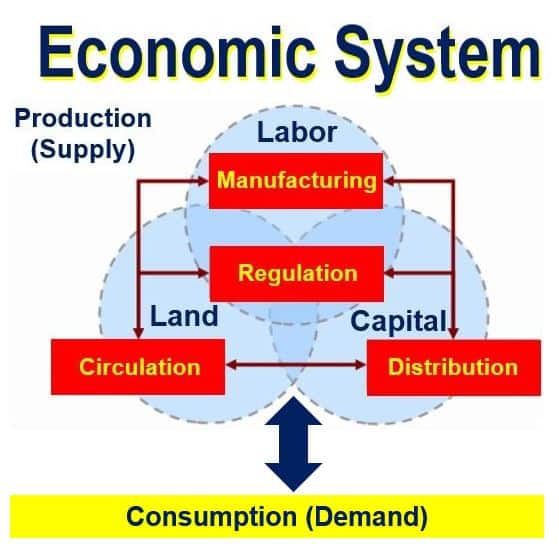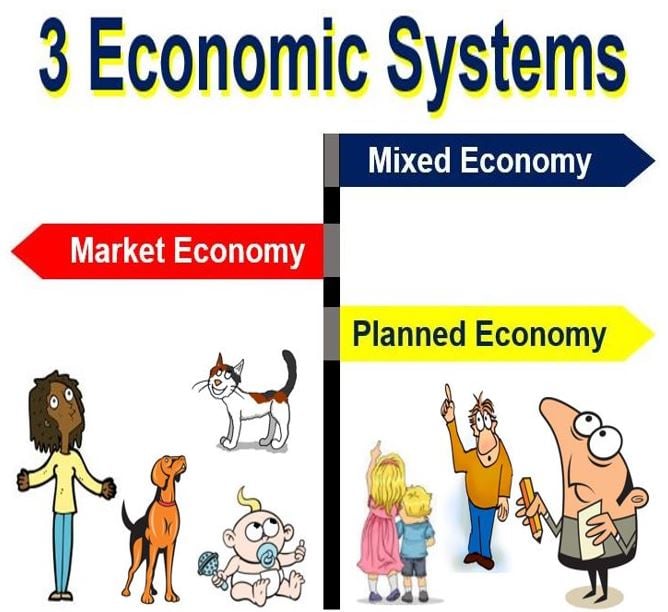What is an economic system? Definition and meaning
An Economic System is an organized way in which a country allocates resources and distributes goods and services across the whole nation or a given geographic area. It includes the combination of several institutions, entities, agencies, decision-making processes, and patterns of consumption that make up the economic structure of a specific community. Hence it is a type of social system.
This framework not only determines how resources are allocated and goods are distributed but also reflects the cultural, political, and technological priorities of the society it governs.
An economic system defines how all the entities in an economy interact. Defining them today is much more complicated than it used to be. Ancient systems were relatively simple – trade was carried out using barter and there were very few treaties and rules of engagement.

Economic systems today are complex
In ancient societies, people only exchanged what they had for what they wanted or needed. Today, however, in monetary economies, the setting is much more sophisticated.
We currently live in a society where massive corporations have a strong influence on how business is done. Agreements and treaties are negotiated and signed every day, and governments have made many laws concerning trade, which means we require a much more comprehensive definition of what an economic system is.
“An economic system, or economic order, is a system of production, resource allocation, and distribution of goods and services within a society. It includes the combination of the various institutions, agencies, entities, decision-making processes, and patterns of consumption that comprise the economic structure of a given community.”
-
More than simple trade
Systems in today’s economies are about much more than simple trade. They define our society’s values and its political structure.
Every economic system looks at three or four basic questions:
- What to produce.
- How to produce and how much.
- Who receives production’s output.
- How change is going to be effected and accommodated.
The structure of each economic system seeks to answer these three or four questions. The system sets the rules of play for all the players in an economy, and defines how they can interact with one another.
The study of economic systems looks at how their various components are interlinked, how information flows between them, and their social relations, including the structure of management and property rights.
-
Planned and market economies
The analysis of economic systems used to focus on two extremes – planned and market economies, and on the differences between socialism and capitalism.
Today the classification of economic systems has expanded to include other models and topics that do not conform to those traditional extremes. Globally, the currently dominant form of economic organization is based on varying versions of a market-oriented mixed economy.

Three main economic systems
In this world there are three main types of economic systems. Governments and their leaders claim to have their own peculiar systems, but they are all basically mixed economies. Economic systems can be basically classed into three categories.
-
Market economy
Here prices are determined by levels of supply and demand, instead of central and or local government. Market forces determine what is produced, how much is produced, how it is distributed, plus the prices of goods and services.
All decisions regarding investment and salaries are also driven by market forces in a market economy.
In a market economy, the government plays a minor role and only lays down the rules so that businesses can thrive. An outdated word for this type of economy is Capitalism.
-
Planned economy
All decisions regarding production, distribution, salaries, investment and prices are made by a central authority – usually the government. The closest examples to this type of economy today are North Korea and Cuba (to a lesser extent).
In a planned economy, also known as a centralized economy, controlled economy or command economy, central government has planners who make all the decisions.
According to economists, the most fundamental difference between a market and planned economy is the existence of private property, i.e. it exists in the free market and does not in the command economy.
-
Mixed Economy
Market economies sometimes get into trouble, at which point the government feels compelled to intervene. Sometimes, when lawmakers believe some players are being exploited unfairly, or the level playing field for business is under threat, the government may become involved.
Similarly, the leaders of a command economy may decide that more investment is required, and the only way to accomplish this is by allowing more freedom.
The moment the government of a command economy loosens its grip, or that of a market economy begins to intervene, they integrate some aspects of the other. When this occurs, the result is a kind of hybrid system – a mixed economy.
With the exception of North Korea, every country in the world has a mixed economy. Even Cuba has elements of a mixed economy – it has a huge black market which the government semi tolerates.
The rapid advancement of technology and the rise of the digital economy have introduced new dynamics into economic systems, challenging traditional regulatory frameworks and prompting innovative approaches to economic management.
Small, ancient societies that depended on hunting and subsistence farming had Traditional Economies. Some small societies today still have this type of economy, such as a traditional Inuit village in North America or a tribe in the Amazon rainforest.
Compound nouns
In the world of business, finance, and economics there are many terms related to “economic systems,” especially compound nouns (terms consisting of two or more words). Let’s have a look at such compound nouns, their meanings, and how we can use them in a sentence:
-
Economic System Analysis
The process of examining the components and workings of an economic system.
Example: “The economic system analysis revealed the strengths and weaknesses of the country’s market dynamics.”
-
Economic System Complexity
A measure of the intricacies and interdependencies within an economic system.
Example: “The economic system complexity makes it difficult to predict outcomes of financial interventions.”
-
Economic System Reform
Changes implemented to modify or improve an existing economic system.
Example: “The government has announced a comprehensive economic system reform to address inequality.”
-
Economic System Model
A theoretical construct representing the structures and functions of an economic system.
Example: “Economists use an economic system model to simulate different scenarios and their potential impacts on the economy.”
-
Economic System Transition
The process through which an economic system changes from one form to another.
Example: “The country is undergoing an economic system transition from a planned to a market-based approach.”
-
Economic System Management
The administration and governance of the rules and operations within an economic system.
Example: “Effective economic system management is crucial for maintaining stability and growth.”
-
Economic System Evaluation
The assessment of an economic system’s performance and functionality.
Example: “The annual economic system evaluation helps the government plan for the next fiscal year.”
Quotes
Vladimir Putin, the President of the Russian Federation, once said: “It’s a historical phenomenon that in 250 years, a nation could move from a colony into the most prosperous nation of the world and the leader of the world. It is indeed an achievement, a tribute to the talent of the American nation, the American people and an optimal political and economic system.”
Jacques Delors, a French economist and politician who was the 8th President of the European Commission (1985-1995), once said: “The European model is, first, a social and economic system founded on the role of the market, for no computer in the world can process information better than the market. Jacques Delors.”
Two Videos
These two YouTube videos come from our sister channel, Marketing Business Network or MBN. They explain what the terms “Economic System” and “Economy” mean using easy-to-understand language and examples:
-
What is an Economic System?
-
What is an Economy?

